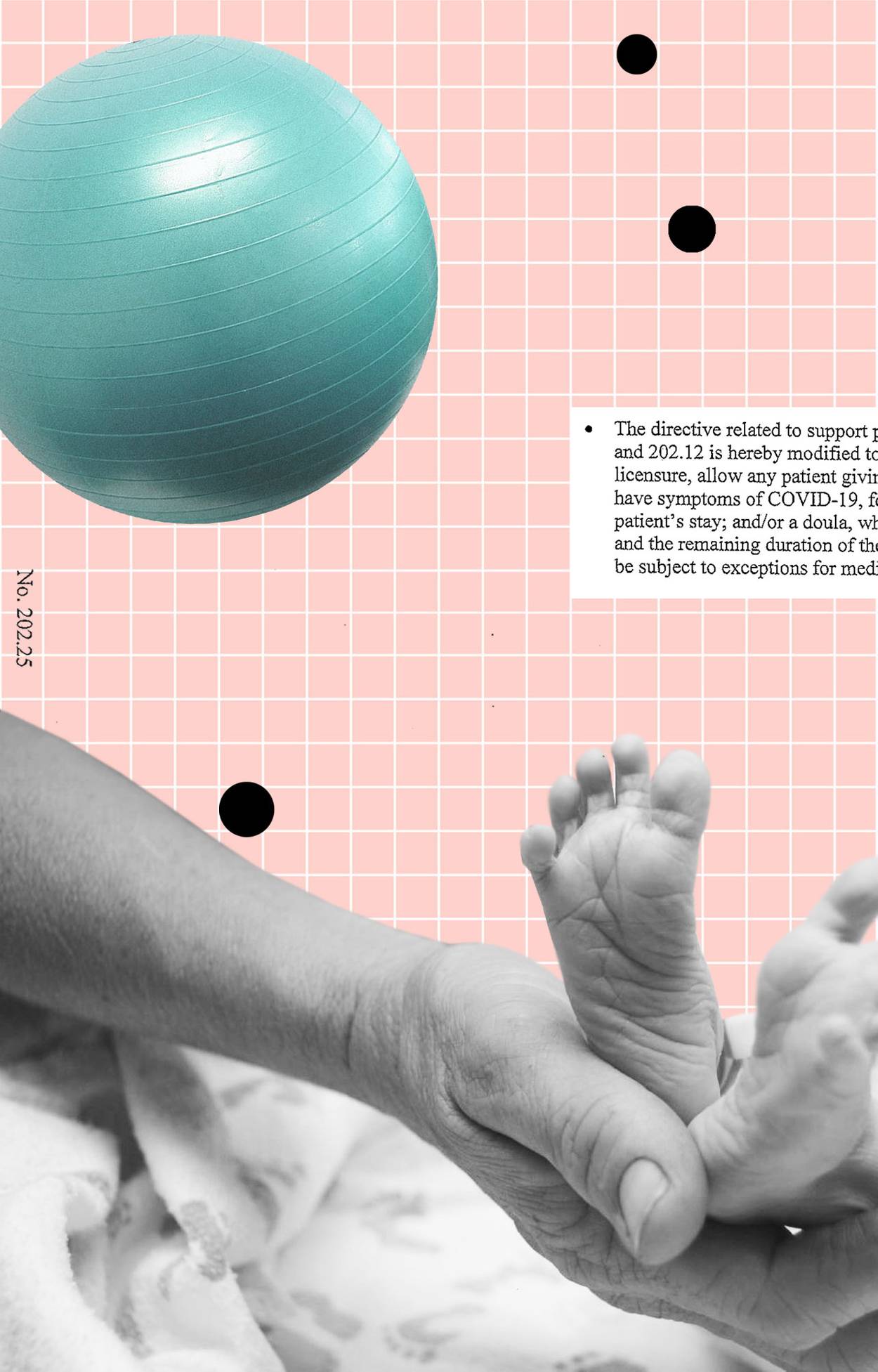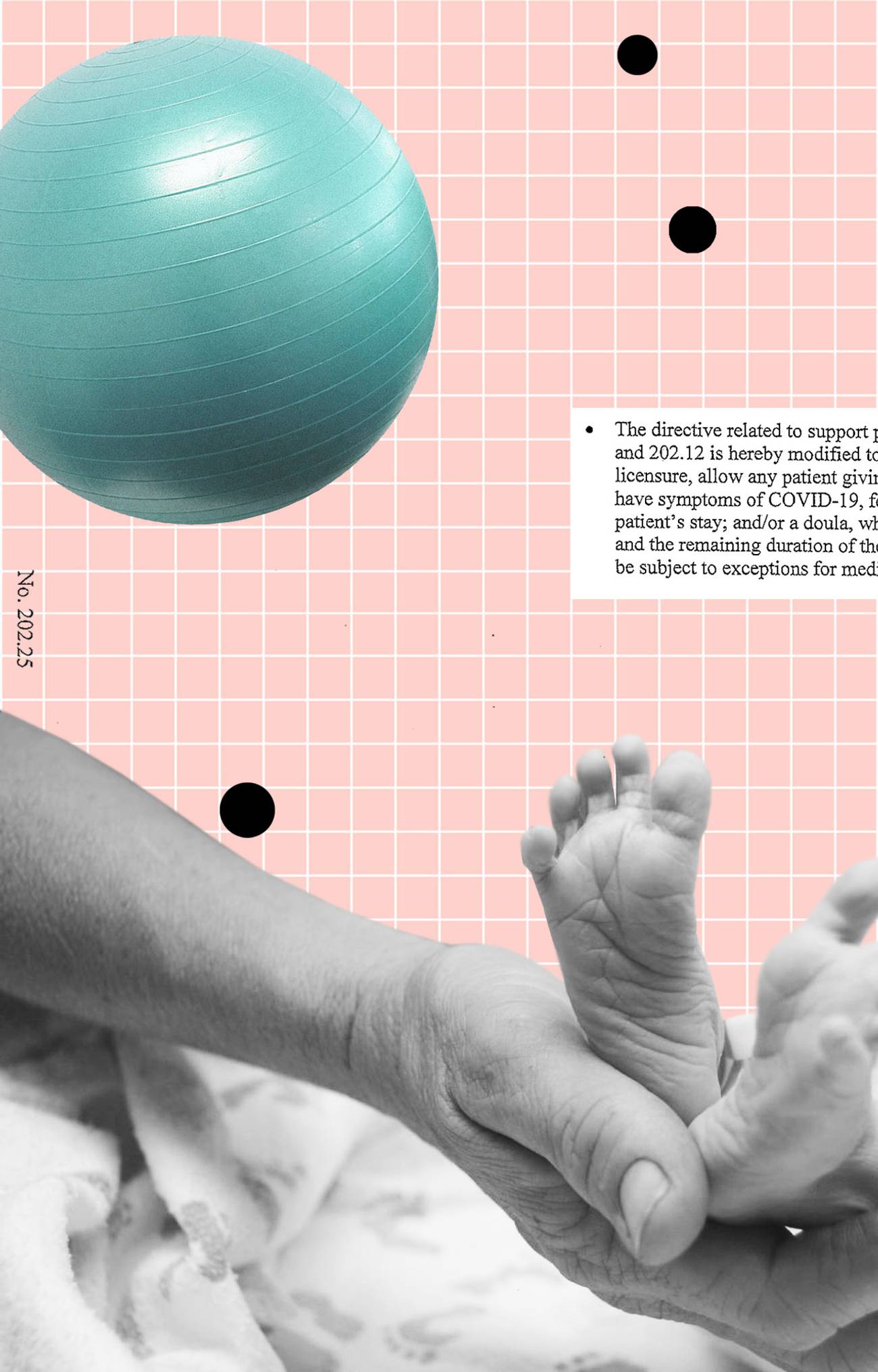The Rise of Mommy Doulas
COVID-19 brought restrictions on how many people are allowed in a delivery room. But for Jewish grandmothers-to-be who are willing to put in the hours, there’s a way to make an exception.




My mother held my right knee during the birth of my first child. My father and mother-in-law anxiously hovered behind a thin blue curtain, while my husband alternated between front row and mezzanine viewing. Everybody saw things they probably shouldn’t have. My husband accidentally uploaded an extremely NC-17 video to a shared family photo album. There were quips made about which excrements had ceremoniously left my body as my baby crowned. Of course, I was too high to care about any of it, but I did make a mental note that on my next go around, it might be nice to have just my husband there.
When I did find out I was pregnant again this spring, it looked like I needn’t make a choice after all: In late March, as the COVID-19 pandemic spread, New York Gov. Andrew Cuomo issued an order that women in labor could have one support person—spouse, sibling, doula, or anyone of her choosing—present in the delivery room. (For a brief time before that order, no support people at all were allowed.) But, facing pressure to loosen the restrictions further, Cuomo signed a subsequent order at the end of April allowing both a support person and a doula in the delivery room.
The expansion to include doulas was considered a major victory for women’s reproductive health. Still, many pregnant women were left with a difficult choice to make: Who would they choose as their one supporting partner? For some, it was a no-brainer: The spouse or partner upon whom the shared responsibility of child-rearing would fall should be the one to witness its birth. For others, the choice between Mom and partner was not an obvious one. Many Jewish women in particular considered the notion of not having their mothers present as abjectly terrifying. So it was for their mothers, too: How could they not bear witness to their own grandchild being escorted earthside?
And so, a new trend began to emerge: mommy doulas. If Mom got certified as a doula, then both she and your partner or spouse could be present in the delivery room.
“Everyone’s doing it,” my mother assured me. And indeed, it seemed she was right. All over the tristate area, Jewish women were enrolling in doula-training workshops. From Monsey to Borough Park to Midwood and all down the Jersey Shore, expectant Jewish grandmothers were being coached in the art of “mothering the mother.” Training was intensive. Some enrolled in Zoom workshops while others attended outdoor conferences, committing themselves to full weekends where, for eight hours each day, they learned everything from massage techniques to modes of comforting squeamish sons-in-law. The results, in many cases, were transformative.
Bruchy Mayer was, in her own words, “corporate America,” before a request 12 years ago to use her home for a doula-training workshop compelled her to change direction. Empowered by the notion that a woman can be an active participant in her own birth, Mayer hosted another workshop, and then another, before ultimately deciding to pursue doula certification of her own. She trained under Dona International and took classes in Mexico. Mayer lives in Monsey, New York, and as far as she knows, she’s the only Orthodox doula trainer for miles. Mayer initially found that a lot of the Jewish women enrolling in her doula-training workshops were empty nesters looking for more purpose. “A lot of times, women in our communities don’t go to be professionals,” she said. “Our profession is our family, that is the Jewish way.” COVID-19 added an entirely new element, and Mayer found herself inundated with requests from women who were expecting grandchildren at the start of the summer.
Felicia Cohen, another doula trainer, saw a similar rise in numbers of grandmothers-to-be who signed up for training this summer: “It started to snowball, my heart and eyes opened,” she said. “This is what Hashem wants: for this army of women to be Shifra and Puah”—a reference to the ancient Hebrew midwives who defied the pharaoh’s decree to kill every Jewish firstborn son. Between Cohen and Mayer, close to 250 mommy doulas have been minted since March, with numbers growing and workshops full into next February.
Although I ultimately declined my own mother’s offer to “doula me,” it’s been interesting to see the shift in connotations of birth among the mothers whose daughters and daughters-in-law did embrace the mommy doula. On day one of the workshop, Mayer introduced the first lesson: Intro to Childbirth. Attendees looked at her cross-eyed. Like, don’t tell me about birth. I’ve been in the room for 14 grandchildren and have five kids of my own. By day two, Mayer said, “their shoulders lowered a little bit.” By day three, there were tears. Attendees shared their own experiences in childbirth, many of them less than ideal, some of them traumatic. There was this sense of this is what we do. We have babies, it’s what we’ve always done, and we’re good at it. Discovering how little some knew about the actual mechanics of childbirth, pain management, and most importantly, choice, threw this tableau into question. “We tell our girls to be strong, not to surrender.” Mayer said. “[But] when you are giving birth you have to surrender. A woman surrenders when she has support and validation.”
Perhaps most importantly, the training disclosed a discrepancy in the way women rely on each other in daily life, but not in childbirth. When we put together a big dinner, organize a charity event, plan a wedding, or handle a death, we deploy the faculties of our communities with near superhuman efficiency. Women come together like a patchwork quilt to aid, comfort, and do in any way they can. Yet when it comes to childbirth, we tend to rely almost entirely on our OB-GYNs and the controlled environments that hospitals and fetal monitoring provide us. (Hi, Dr. Kramer, you’re still my favorite!)
It isn’t surprising then, why Jewish women have flocked to become doulas during the pandemic. “As a minority group, Jews were always dependent on the eldest woman in the village,” Mayer told me. Many Hispanic and Italian grandmothers-to-be have rushed to her training workshops as well. (Both Cohen and Mayer have themselves trained with Mexican communities.) What began, frankly, as a loophole in order to get into the delivery room, turned out to be the missing puzzle piece in the mosaic of family life for many women.
“There’s one more workshop this weekend,” my mother notified me in December. I was in the final weeks of my pregnancy, close enough to feel the epidural I said I wouldn’t take in my first labor (but would later wind up politely offering to stab myself in the back with) coursing through my body. “Are you sure you don’t want me there?”
I emphatically replied that yes, no offense, I was sure. It doesn’t mean I don’t love you but, like, also, can you stop guilting me? I was surprised when Cohen commended my decision. “That is your choice,” she said. “It was a difficult one and you made it.” It actually wasn’t that difficult, I felt myself starting to say, before stopping. Or rather, surrendering. Validation of my decision left me with nothing to prove.
I had effectively been doula’d.
Esther Levy Chehebar is a Brooklyn-based writer. She is currently at work on a novel loosely inspired by her Syrian Jewish upbringing.